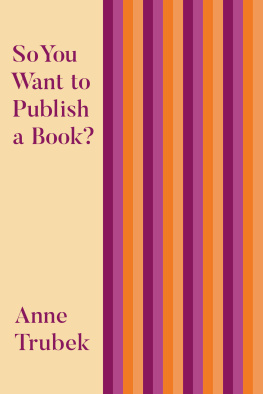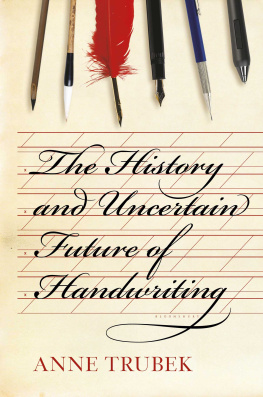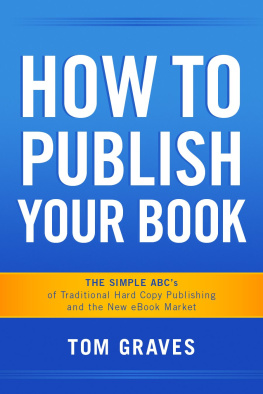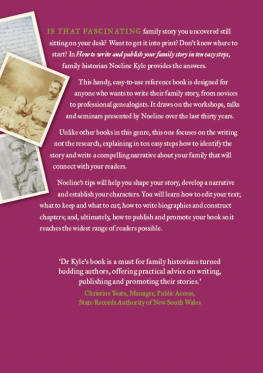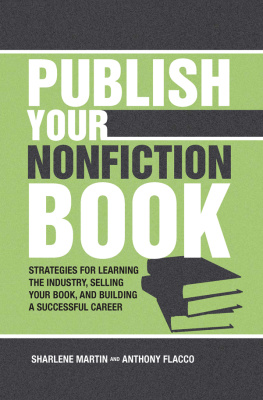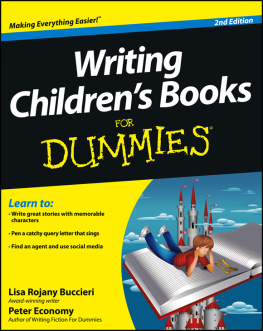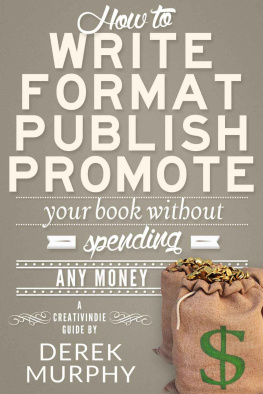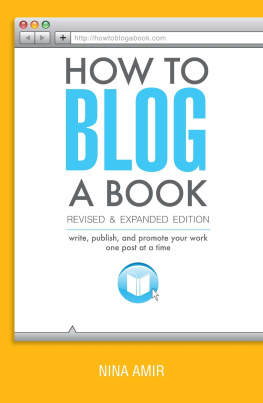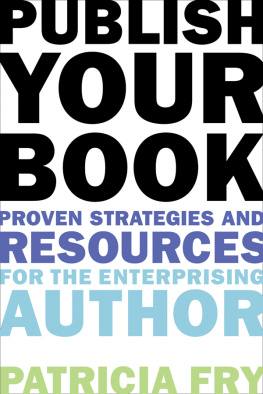
So You
Want to
Publish
a Book?
So You
Want to
Publish
a Book?
Anne
Trubek

Copyright 2020 by Anne Trubek
All rights reserved. This book or any portion thereof may not be
reproduced or used in any manner whatsoever without the express
written permission of the publisher except for the use of brief
quotations in a book review.
Printed in the United States of America
First edition 2020
1 2 3 4 5 6 7 8 9
ISBN: 978-1-948742-66-5

Belt Publishing
3143 W. 33rd Street #6
Cleveland, Ohio 44109
www.beltpublishing.com
Cover by David Wilson
Book design by Meredith Pangrace
CONTENTS
So You
Want to
Publish
a Book?
Introduction
W hen I was in high school, I wrote bad poetry, as teenagers are wont to do. I wrote thinly veiled poems about boys I had crushes on, and pretentious poems about the passage of time. One overwrought lyric was about my disappointment upon looking at the author photo on the back of a poetry collectionI am pretty sure it was Wallace Stevensand seeing the wizened face of the author. I remember my terribly clever last line: Poets should never be old.
I tell you this because it tells you something important about me: by sixteen, I was already fascinated by, and opining on, the material elements of books and how they connect to our ideas about what writing is. We may have presuppositions about a books author, but once we see an actual photo on a piece of paper that shows what the author looks like, we confront the contrast between our ideas about an author and the authors actual appearance.
Writing is both a thing and not a thing; material and immaterial. Letters and ideas. Imagination and paper. Knowledge and a commodity. This has always obsessed me during my zig-zaggy career from English professor to freelance writer to book writer to magazine founder to publisher. The beauty of writing has resided in its immateriality, its ability to transcend place and time, weight and mass. It is not the thingness that gives writing its power; it is its ability to escape any grasp. But for writing to be nothing, it must inevitably (and paradoxically) be embodied, made into a thing. A scrap of paper. A screen that contains pixels. Something inked, or pressed, or carved. Arbitrarily chosen marks that correspond to sounds. Stuck between boards or lit by browsers. And sometimes, something accompanied by a photo of an individual who, somewhere else, at some other time, created those marks.
These seemingly opposing dichotomies are the through line of my career. I started thinking about how we make writing into things in college, and I continued to do so while I was a PhD student in English. Then I became a college professor and wrote booksA Skeptics Guide to Writers Houses and The History and Uncertain Future of Handwritingthat took up different aspects of this obsession. Eventually, I left academia and started Belt, my own publishing company. Some people, looking at my CV, laugh about how various and unexpected it is: a few years ago, I was a tenured professor at Oberlin College; today, I run a small press focused on the Rust Belt. Along the way, I have edited a textbook on writing technologies, written books on writers house museums and the history of handwriting, and edited collections of essays about Cleveland and the Rust Belt. Now a publisher, I oversee the making of books. So far, only two people have been able to figure out the connective thread running through my career on their own.
You are obsessed by the materiality of books, they told me. I almost cried, both times, when these strangers revealed they had figured out the puzzle.
So if my path to becoming a publisher seems like a winding one, it has actually been relatively straight, in that the same central idea has always driven and fascinated me. I have never worked for another publishing company. But I have spent my life staring at author photos, studying the history of the book in the West, traveling around the country visiting museums dedicated to writers, and researching the different tools humans have used to make letters, words, sentences, and paragraphs over many centuries. The fact that I now spend most of my days editing, typesetting, talking to printers, assigning ISBNs, entering metadata, sending out press releases, and shipping paper to customers isnt all that surprising.
Being obsessed with a rather arcane concept like writing has made things difficult for me at points, both for chitchat and in interviews. When I have been lucky enough to have journalists interested in a book of mine, the first question I am often asked is, How did you get interested in that? I have found if I respond with, Reading a lot of Roland Barthes in college, or, Ive always been fascinated by the materiality of writing, the questioner either assumes I am dodging or rejects the answer as not making good copy. Theyll ask again for some personal story that sparked my obsession. Did I have bad handwriting in elementary school? Did my dad take me to Ernest Hemingways house when I was a kid? Or maybe it all has to do with being a mother? Whats the real reason? they implore, with their tone and their looks. I want to reply, A LIFE OF THE MIND CAN BE A REAL REASON! but that answer would only be critiqued, accurately, as snobbish. So instead, I invent some biographical answer and hope to move on.
Finding an answer to this question isnt any easier now that publishing books, rather than writing them, consumes most of my time. It is difficult to describe what I do now too. I publish books is a sentence that could refer to either writing or producing books. So instead I reply with, I am a publisher. This answer pains me, though, because it sounds so passive. But when I say, I am a publisher, no one is confused if Im referring to writing books or to making the physical accoutrements to embody words. Nor, thankfully, does anyone ask me for the real reason why I am a publisher. It seems that you dont need a personal backstory in order to decide to finance the material creation and dissemination of the written word.
This confusion over the verb publish explains the title of this book, which Ive written for writers as well as for prospective publishers (as well, of courseI hope!for experienced authors, people in the publishing world, and anyone curious about the inner workings of a culture industry). The implied you in the title might be addressed to a range of people with similar questions: What does a publisher do? How does a writer secure a book contract? How do designers, editors, and publishers transform a Word document into paper that is bound by boards, stamped with a barcode, and sold to consumers?
Despite a lifetime of reading about books and their histories, I had a very fuzzy conception of my job as a publisher before I actually started doing it. Scholars, going all the way back to Plato, have spent far more time researching what it means to read or write than they have researching what publisherswho serve as the crucial conduit between those two activitiesactually do. Going through the process of writing books that were published helped me understand the publishing process in its barest outlines, at least from the authors point of view. But it was only once I decided to sit on the other side of the deskacquiring, editing, and printing instead of being acquired, edited, and printedthat I really started to understand the industry.
Next page
